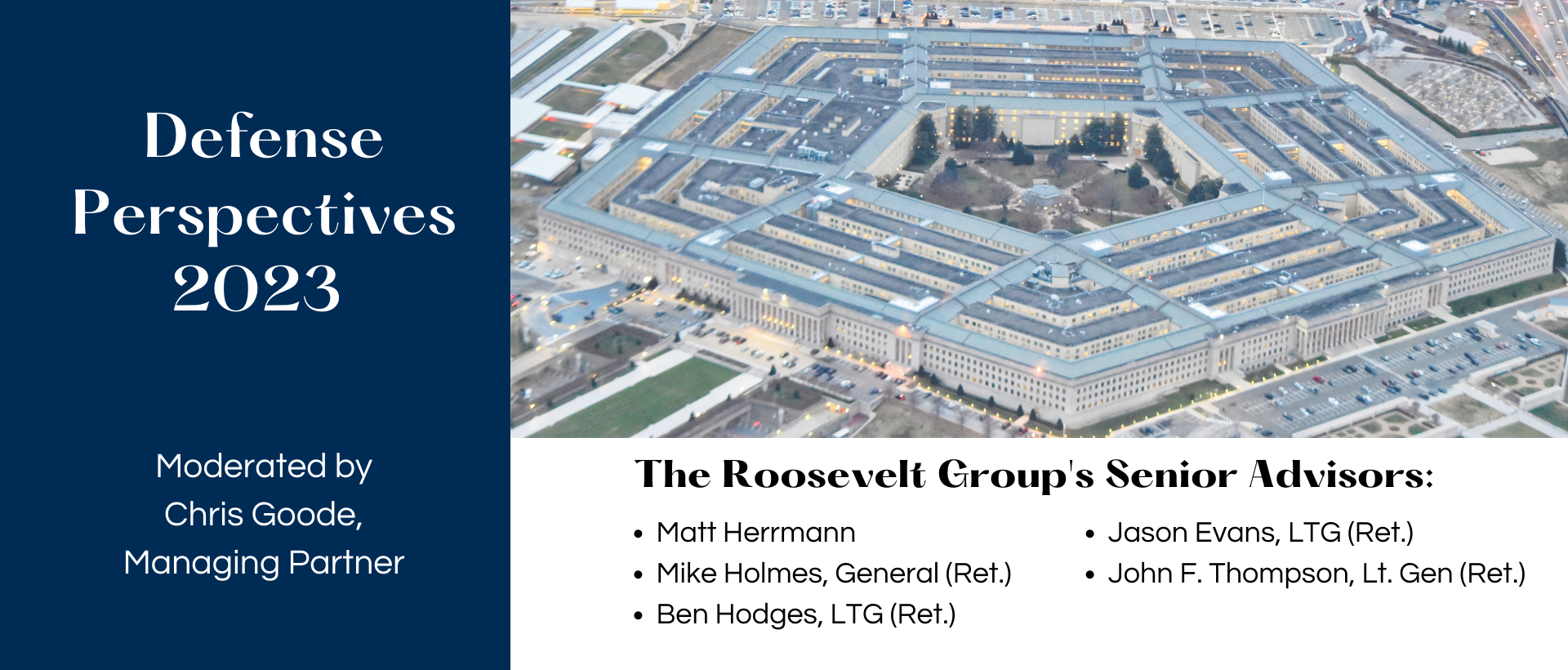On October 26, TRG hosted a live webinar with an impressive panel of defense experts from its Senior Advisors team. Moderated by Managing Partner Chris Goode, the panelists discussed various topics ranging from Senate appropriations and implications around elections to anticipation and strategy around China’s escalating agenda against Taiwan and possible outcomes in the war in Ukraine. TRG experts Matthew Herrmann, General (Ret.) Mike Holmes, USAF, Lieutenant General (Ret.) Jason Evans, USA, Lt. Gen. (Ret.) John F. Thompson, USSF/USAF, and LTG (Ret.) USA Ben Hodges, USA provide prescient, timely, and knowledgeable information and insights on US Defense at home and from a global perspective.
Questions addressed and answered include:
- What really is the danger in the impact of continuing resolutions of late National Defense Authorization Acts, (NDAAs)?
- Does the DoD do a good job when they testify before posture hearings and before members and senators to really explain the impacts of Continuing Resolutions?
- Outside of a potential shutdown, what else do you see in terms of impacts to defense clients and defense communities with a Republican turnover in the House or the Senator or both, in terms of rules, procedures, philosophies on funding in general?
- Why does the Army have to compete so hard for talent, and what are they doing to address it at the foundational level?
- If there are future BRACs or downsizings, is the effort worth it? How will the Chief, will the G-9 proactively remember who’s investing and who’s not? Or is that a consideration at all in future basing or BRAC decisions?
- The Air Force went through a major reorganization to merge the 24th and 25th Air Forces, integrating a whole slew of capabilities; cyber, ISR, electronic warfare and information operations. What was the genesis of such a major consolidation and how has that consolidation worked out so far, and will serve the nation well into the future?
- Recent war games through the Center for New American strategy focused on a forcible Chinese unification with Taiwan in 2027. The Chief of Naval Operations just days ago in a conference mentioned we should be prepared for such an invasion this year or next. What is driving another acceleration of China’s timeline, and what did you learn that you can share with this audience?
- Why is there not more support for a Space National Guard? how comfortable are you that the public does understand the militarization of space today? What combat looks like in space, not tomorrow, tonight, and the potential impacts on the public?
- What’s coming down the line in terms of the big programs that the defense industry and the space industry are most focused on and the programs you’re most interested in?
- What has surprised you the most about the performance of both the Russian armed forces and the Ukrainian armed forces as you’ve tracked this conflict?
- With winter coming, will that mean that both sides will dig in and pause any major offenses, what will the Ukrainians do regarding operations in Kherson over the next 90 to 120 days?
- What is going to happen in the Black Sea next, from a Russian Navy perspective, and is the Black Sea contested water space or not?
- The Russians are claiming the Ukrainians may deploy a dirty nuke. How worrisome is that to you as an excuse for the use of a Russian nuclear weapon? And is Crimea that could be the real lynchpin to set up for such a contingency?
To stay up to date on appropriations, defense, advanced technologies, and more, sign up for our Executive Insight Brief released every Friday.
